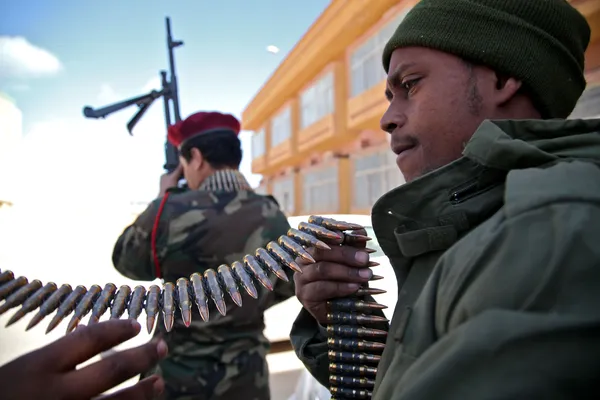Eye For Film >> Movies >> First To Fall (2013) Film Review
First To Fall
Reviewed by: Amber Wilkinson

One of the interesting things about Jehane Noujaim's Tahrir documentary The Square was the presence of Kite Runner actor Khalid Abdalla, a Glasgow-born man with Egyptian heritage who headed to the country to do what he could to help the revolution. Rachel Beth Anderson zooms in on that theme in First To Fall, which looks at two ex-pat Libyans - now living in Canada - who are drawn to return to their homeland in 2011 to take up arms against Muammar Gaddafi.
Hamid is 26 and bears all the hallmarks of Canadian influence, with his streetwise attitude and baseball hat permanently cocked to one side. Twenty-one-year-old Tarek, on the other hand, is a more serious sort who seems slightly in awe of his jokier friend, whom he notes has "got no fear inside him". A situation which, given the volatility of Libya, is set to change.
In a revelation that brings home just how young these men are, one of them reveals that he asked permission from his mum to go - as though it was late night clubbing venture. Perhaps worse still, the other simply lies to his parents about where he is.
"Have you fired a gun before?"
"I've played Call Of Duty."
They are about to discover that the reality of war, with its very real prospect of blood, is a long way from your average PC game.
Despite their closeness, almost as soon as they arrive in Libya they find themselves split up, as the cocksure Hamid slips quickly into the groove with the locals, winning them over by offering to capturing their war effort. "We have a camera... it is our gun," he says, although the presence of one soon leads to the shooting of the other. Left behind, Tarek, though less self-assured, sets about finding his own way to the frontline.
Like documentarian Talal Derki and his fellow cinematographers who shot Return To Homs, Anderson and her co-director Tim Gruzca have taken a lot of risks to get this footage, which frequently captures gun fights and they certainly deserve plaudits for bravery.
Like so many of these up close and personal documentaries, however, there is very little scene-setting in terms of the revolution itself, meaning that some knowledge of the situation on the part of the viewer will help immensely in terms of orientating yourself. The focus on the two men is also kept very narrow, so that there is not much indication of what those around them think of these two guys fresh back from Canada.
The filmmakers do succeed in showing the piecemeal nature of the revolution in Libya and its impact on the landscape. Early shots of an azure sea could have been taken from a holiday show, until the camera turns its gaze to a burnt-out car. This isn't a war in the traditional sense, with fixed battle lines and a no-man's land, but rather a series of scruffy, if deadly, skirmishes, that tend to revolve around mealtimes or break out randomly. The weaponry and equipment used by the rebels is also ad-hoc, with souped up shotguns and cars pimped out as tanks.
The atmosphere generated is surreal, a point underlined by shots of a hospital where all the women and children want to be photographed holding a semi-automatic. Elsewhere, there is poignancy, both in the changes that their experiences force on Hamid and Tarek and in other subtler scenes, such as a child moving in and out of a crowd of praying men. It's a nod towards an uncertain future and a disillusionment which Hamid will go on to spell out. What has changed in Libya remains debatable but these men's lives have been irrevocably altered.
Reviewed on: 10 Apr 2014

















